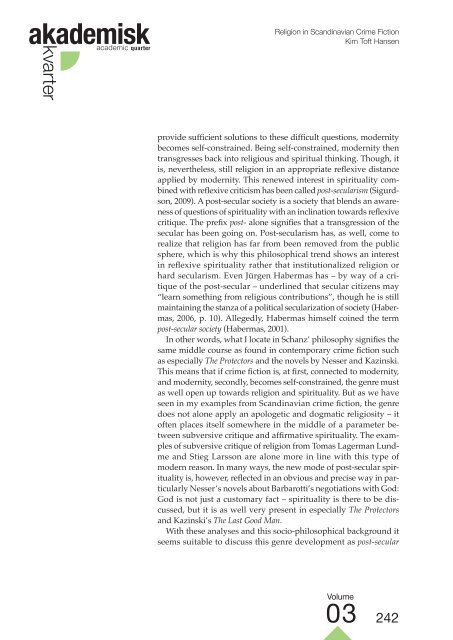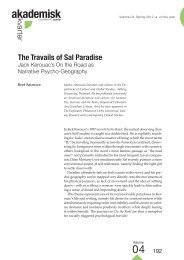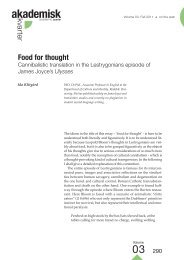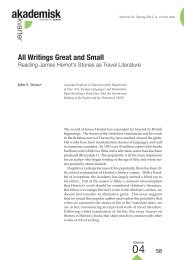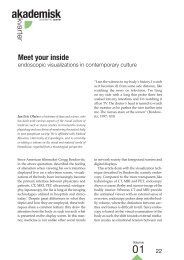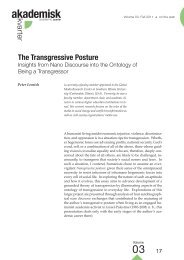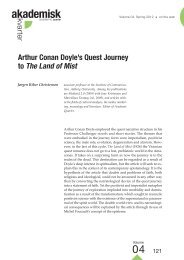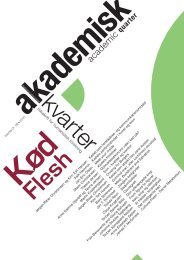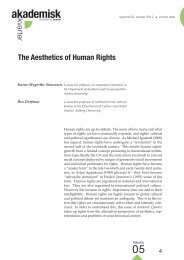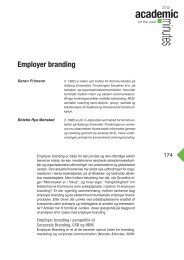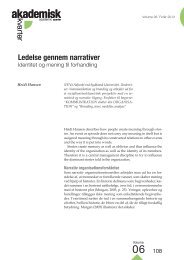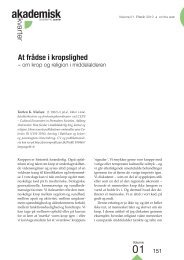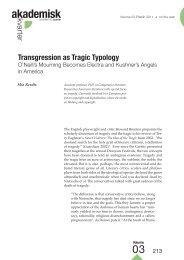- Page 1 and 2:
Volume 03 12 • 2011Aalborg Univer
- Page 3 and 4:
Aalborg Universitetakademiskacademi
- Page 5 and 6:
akademiskacademic quarterkvarterTra
- Page 7 and 8:
akademiskacademic quarterkvarterTra
- Page 9 and 10:
akademiskacademic quarterkvarterTra
- Page 11 and 12:
akademiskacademic quarterkvarterTra
- Page 13 and 14:
akademiskacademic quarterkvarterTra
- Page 15 and 16:
akademiskacademic quarterkvarterTra
- Page 17 and 18:
akademiskacademic quarterkvarterVol
- Page 19 and 20:
akademiskacademic quarterkvarterThe
- Page 21 and 22:
akademiskacademic quarterkvarterThe
- Page 23 and 24:
akademiskacademic quarterkvarterThe
- Page 25 and 26:
akademiskacademic quarterkvarterThe
- Page 27 and 28:
akademiskacademic quarterkvarterThe
- Page 29 and 30:
akademiskacademic quarterkvarterThe
- Page 31 and 32:
akademiskacademic quarterkvarterThe
- Page 33 and 34:
akademiskacademic quarterkvarterThe
- Page 35 and 36:
akademiskacademic quarterkvarterThe
- Page 37 and 38:
akademiskacademic quarterkvarterThe
- Page 39 and 40:
akademiskacademic quarterkvarterThe
- Page 41 and 42:
akademiskacademic quarterkvarterThe
- Page 43 and 44:
akademiskacademic quarterkvarterThe
- Page 45 and 46:
akademiskacademic quarterkvarterThe
- Page 47 and 48:
akademiskacademic quarterkvarterThe
- Page 49 and 50:
akademiskacademic quarterkvarterVol
- Page 51 and 52:
akademiskacademic quarterkvarterDem
- Page 53 and 54:
akademiskacademic quarterkvarterDem
- Page 55 and 56:
akademiskacademic quarterkvarterDem
- Page 57 and 58:
akademiskacademic quarterkvarterDem
- Page 59 and 60:
akademiskacademic quarterkvarterDem
- Page 61 and 62:
akademiskacademic quarterkvarterDem
- Page 63 and 64:
akademiskacademic quarterkvarterDem
- Page 65 and 66:
akademiskacademic quarterkvarterDem
- Page 67 and 68:
akademiskacademic quarterkvarterTea
- Page 69 and 70:
akademiskacademic quarterkvarterTea
- Page 71 and 72:
akademiskacademic quarterkvarterTea
- Page 73 and 74:
akademiskacademic quarterkvarterTea
- Page 75 and 76:
akademiskacademic quarterkvarterTea
- Page 77 and 78:
akademiskacademic quarterkvarterTea
- Page 79 and 80:
akademiskacademic quarterkvarterTea
- Page 81 and 82:
akademiskacademic quarterkvarterVol
- Page 83 and 84:
akademiskacademic quarterkvarterFor
- Page 85 and 86:
akademiskacademic quarterkvarterFor
- Page 87 and 88:
akademiskacademic quarterkvarterFor
- Page 89 and 90:
akademiskacademic quarterkvarterFor
- Page 91 and 92:
akademiskacademic quarterkvarterFor
- Page 93 and 94:
akademiskacademic quarterkvarterVol
- Page 95 and 96:
akademiskacademic quarterkvarter”
- Page 97 and 98:
akademiskacademic quarterkvarter”
- Page 99 and 100:
akademiskacademic quarterkvarter”
- Page 101 and 102:
akademiskacademic quarterkvarter”
- Page 103 and 104:
akademiskacademic quarterkvarter”
- Page 105 and 106:
akademiskacademic quarterkvarter”
- Page 107 and 108:
akademiskacademic quarterkvarterVol
- Page 109 and 110:
akademiskacademic quarterkvarterDol
- Page 111 and 112:
akademiskacademic quarterkvarterDol
- Page 113 and 114:
akademiskacademic quarterkvarterDol
- Page 115 and 116:
akademiskacademic quarterkvarterDol
- Page 117 and 118:
akademiskacademic quarterkvarterDol
- Page 119 and 120:
akademiskacademic quarterkvarterDol
- Page 121 and 122:
akademiskacademic quarterkvarterVol
- Page 123 and 124:
akademiskacademic quarterkvarterIco
- Page 125 and 126:
akademiskacademic quarterkvarterIco
- Page 127 and 128:
akademiskacademic quarterkvarterIco
- Page 129 and 130:
akademiskacademic quarterkvarterIco
- Page 131 and 132:
akademiskacademic quarterkvarterIco
- Page 133 and 134:
akademiskacademic quarterkvarterIco
- Page 135 and 136:
akademiskacademic quarterkvarterVol
- Page 137 and 138:
akademiskacademic quarterkvarterThe
- Page 139 and 140:
akademiskacademic quarterkvarterThe
- Page 141 and 142:
akademiskacademic quarterkvarterThe
- Page 143 and 144:
akademiskacademic quarterkvarterThe
- Page 145 and 146:
akademiskacademic quarterkvarterThe
- Page 147 and 148:
akademiskacademic quarterkvarterVol
- Page 149 and 150:
akademiskacademic quarterkvarterTra
- Page 151 and 152:
akademiskacademic quarterkvarterTra
- Page 153 and 154:
akademiskacademic quarterkvarterTra
- Page 155 and 156:
akademiskacademic quarterkvarterTra
- Page 157 and 158:
akademiskacademic quarterkvarterTra
- Page 159 and 160:
akademiskacademic quarterkvarterVol
- Page 161 and 162:
akademiskacademic quarterkvarterFli
- Page 163 and 164:
akademiskacademic quarterkvarterFli
- Page 165 and 166:
akademiskacademic quarterkvarterFli
- Page 167 and 168:
akademiskacademic quarterkvarterFli
- Page 169 and 170:
akademiskacademic quarterkvarterFli
- Page 171 and 172:
akademiskacademic quarterkvarterFli
- Page 173 and 174:
akademiskacademic quarterkvarterFli
- Page 175 and 176:
akademiskacademic quarterkvarterFli
- Page 177 and 178:
akademiskacademic quarterkvarterFli
- Page 179 and 180:
akademiskacademic quarterkvarterVol
- Page 181 and 182:
akademiskacademic quarterkvarterEn
- Page 183 and 184:
akademiskacademic quarterkvarterEn
- Page 185 and 186:
akademiskacademic quarterkvarterEn
- Page 187 and 188:
akademiskacademic quarterkvarterEn
- Page 189 and 190:
akademiskacademic quarterkvarterEn
- Page 191 and 192: akademiskacademic quarterkvarterEn
- Page 193 and 194: akademiskacademic quarterkvarterEn
- Page 195 and 196: akademiskacademic quarterkvarterDoe
- Page 197 and 198: akademiskacademic quarterkvarterDoe
- Page 199 and 200: akademiskacademic quarterkvarterDoe
- Page 201 and 202: akademiskacademic quarterkvarterDoe
- Page 203 and 204: akademiskacademic quarterkvarterDoe
- Page 205 and 206: akademiskacademic quarterkvarterDoe
- Page 207 and 208: akademiskacademic quarterkvarterDoe
- Page 209 and 210: akademiskacademic quarterkvarterDoe
- Page 211 and 212: akademiskacademic quarterkvarterDoe
- Page 213 and 214: akademiskacademic quarterkvarterVol
- Page 215 and 216: akademiskacademic quarterkvarterTra
- Page 217 and 218: akademiskacademic quarterkvarterTra
- Page 219 and 220: akademiskacademic quarterkvarterTra
- Page 221 and 222: akademiskacademic quarterkvarterTra
- Page 223 and 224: akademiskacademic quarterkvarterTra
- Page 225 and 226: akademiskacademic quarterkvarterTra
- Page 227 and 228: akademiskacademic quarterkvarterTra
- Page 229 and 230: akademiskacademic quarterkvarterTra
- Page 231 and 232: akademiskacademic quarterkvarterVol
- Page 233 and 234: akademiskacademic quarterkvarterRel
- Page 235 and 236: akademiskacademic quarterkvarterRel
- Page 237 and 238: akademiskacademic quarterkvarterRel
- Page 239 and 240: akademiskacademic quarterkvarterRel
- Page 241: akademiskacademic quarterkvarterRel
- Page 245 and 246: akademiskacademic quarterkvarterRel
- Page 247 and 248: akademiskacademic quarterkvarterOnt
- Page 249 and 250: akademiskacademic quarterkvarterOnt
- Page 251 and 252: akademiskacademic quarterkvarterOnt
- Page 253 and 254: akademiskacademic quarterkvarterOnt
- Page 255 and 256: akademiskacademic quarterkvarterOnt
- Page 257 and 258: akademiskacademic quarterkvarterOnt
- Page 259 and 260: akademiskacademic quarterkvarterGen
- Page 261 and 262: akademiskacademic quarterkvarterGen
- Page 263 and 264: akademiskacademic quarterkvarterGen
- Page 265 and 266: akademiskacademic quarterkvarterGen
- Page 267 and 268: akademiskacademic quarterkvarterGen
- Page 269 and 270: akademiskacademic quarterkvarterVol
- Page 271 and 272: akademiskacademic quarterkvarterGr
- Page 273 and 274: akademiskacademic quarterkvarterGr
- Page 275 and 276: akademiskacademic quarterkvarterGr
- Page 277 and 278: akademiskacademic quarterkvarterGr
- Page 279 and 280: akademiskacademic quarterkvarterGr
- Page 281 and 282: akademiskacademic quarterkvarterVol
- Page 283 and 284: akademiskacademic quarterkvarterThe
- Page 285 and 286: akademiskacademic quarterkvarterThe
- Page 287 and 288: akademiskacademic quarterkvarterThe
- Page 289 and 290: akademiskacademic quarterkvarterThe
- Page 291 and 292: akademiskacademic quarterkvarterFoo
- Page 293 and 294:
akademiskacademic quarterkvarterFoo
- Page 295 and 296:
akademiskacademic quarterkvarterFoo
- Page 297 and 298:
akademiskacademic quarterkvarterFoo
- Page 299 and 300:
akademiskacademic quarterkvarterFoo
- Page 301 and 302:
akademiskacademic quarterkvarterFoo
- Page 303 and 304:
akademiskacademic quarterkvarterFoo
- Page 305 and 306:
akademiskacademic quarterkvarterFoo
- Page 307 and 308:
akademiskacademic quarterkvarterBod
- Page 309 and 310:
akademiskacademic quarterkvarterBod
- Page 311 and 312:
akademiskacademic quarterkvarterBod
- Page 313 and 314:
akademiskacademic quarterkvarterBod
- Page 315:
akademiskacademic quarterkvarterBod


